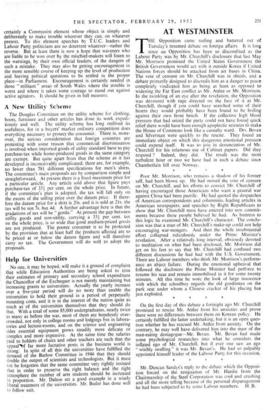Help for Universities
No one, it may be hoped, will make it a ground of complaint that while Education Authorities are being asked to trim their estimates of primary and secondary school expenditure the Chancellor of the Exchequer is not merely maintaining but increasing grants to universities. Actually the yearly increase over a five-year period will do no more than enable the universities to hold their ground in a period of perpetually mounting costs, and it is in the interest of the nation quite as much as of the universities themselves that they should do that. With a total of some 85,000 undergraduates, nearly twice as many as before the war, most of them are hopelessly over- crowded, not only in college rooms and lodgings but in labora- tories and lecture-rooms, and on the science and engineering sides essential equipment grows steadily more delicate or complex and more expensive. At the same time the salaries paid to holders of chairs and other teachers are such that the appeal'ef far more lucrative posts in the business world is strong! In spite of all this the universities have fulfilled the demand of the Barlow Committee in 1946 that they should double the output of scientists and technologists. But it must not be forgotten that the same committee very rightly insisted that in order to preserve the right balance and the right atmosphere the number of arts students should be increased in proportion. Mr. Dalton set a good example in a wisely liberal treatment of the universities. Mr. Butler has done well to follow suit.


































 Previous page
Previous page